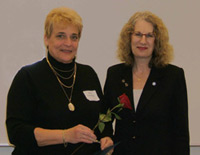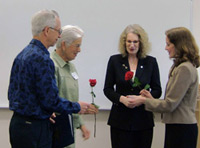|
Legacy Society
Foundation hosts Legacy Society gatherings
Private gifts and bequests help provide funding stability to Lane Community College. The Foundation held a March 15 luncheon to honor those who have named Lane Community College Foundation as the recipient of their will, insurance or retirement policies, trusts and other planned gifts.
A planned gift today can benefit Lane tomorrow.
Please remember Lane in your will.
Many people would like to make larger charitable gifts to support the organizations and institutions they care most about. There are many options to give to the Lane Community College Foundation while actually enhancing your financial security or that of loved ones.
In making a new plan for the future financial well being of yourself and loved ones, you may wish to begin with your will. Many people choose to provide for charitable interests by making gifts through their wills. Bequests can be made in the form of specific amounts of cash, other property, a percentage of the overall estate, or all or a portion of the residue ("what's left" after other bequests have been fulfilled). A will may be used along with, or to create, many of the plans of giving described here. Rely on your attorney and other advisors to guide you through the estate planning process. |
Foundation staff share their appreciation for Legacy gifts made by: |

Mary Forestieri |

Bill and Lynn Buskirk |

Greg Fisher |
Ways to Give
Bequests
A bequest is a gift made through your will that directs your estate
executor to make a gift from your assets to the person or institution
of your choice after you die. Bequests may be used to provide gifts
of money, stocks, real estate, or other property such as art or
jewelry. When donors leave a bequest to Lane, they can make a generous
gift without reducing their current income or giving up ownership
of the assets during their lifetime. Donors can create funds in
their name or in memory of a loved one. Charitable bequests are
usually deductible in full for estate tax purposes.
To leave a bequest to the Lane, contact our Foundation Director
at (541) 463-5226 or foundation@lanecc.edu.
Back to List
Charitable Remainder Trusts
Charitable remainder trusts allow you to transfer assets into a
separately managed trust that will provide you and/or your beneficiaries
with fixed percentage payments for life or for a set period of time.
The person who establishes the trust selects the trustee as well
as the charities that will receive future distributions. The donor
earns a charitable deduction when the assets are transferred to
a trust. Upon termination of the trust, the remaining assets are
distributed to the charity and will be used for the charitable purpose
specified by the donor.
To establish a charitable remainder trust for the benefit of Lane,
contact our Foundation Director at (541) 463-5226 or foundation@lanecc.edu.
Back to List
Charitable Annuity Trust
With a charitable annuity trust, the donor transfers assets to
the Foundation in exchange for a guaranteed, fixed annuity payment
to them or one other beneficiary for life. The annual payment is
a fixed sum, the amount of which is based on the size of the gift
and the number and ages of the beneficiaries. In addition to the
charitable deduction, a portion of the annuity payment is generally
tax-deductible. Upon the death of the donor, the Foundation receives
the full amount of the initial gift to use as specified by the donor.
To establish a charitable annuity trust for the benefit of Lane,
please contact our Foundation Director at (541) 463-5226 or foundation@lanecc.edu
Back to List
Retirement Assets
One frequently overlooked way donors can make a charitable contribution
is by using qualified retirement assets. Subject to income and estate
tax, retirement plan assets are among the most taxed assets at death
in larger estates. While current tax law does not allow the donor
to transfer these assets directly to the Lane, the donor can name
the Foundation as the beneficiary on the account during his or her
lifetime and, by doing so, may be able to avoid both income and
estate taxes upon his or her death.
To name Lane as a beneficiary for all or any of your retirement
plan assets, contact our Foundation Director at (541) 463-5226 or
foundation@lanecc.edu.
Back to List
Life Insurance
A gift of life insurance policy can be a great way to combine charitable
objectives with tax advantages to donors since donors may receive
an income tax deduction by naming Lane as a partial beneficiary
or owner of a life insurance policy. You can name Lane as a designated
or alternate beneficiary of a life insurance policy, a deferred
annuity contract, an IRA, a defined benefit plan, a 401(k) plan,
a defined profit sharing plan, or other qualified plans.
There are several ways for donors to make gifts through their life
insurance. Some of the most popular options are:
- Purchase a policy and designate Lane as the irrevocable owner
and beneficiary of the policy.
- Designate Lane as the new owner or beneficiary in an existing
policy.
- Add Lane to an existing policy as a remainder or final beneficiary,
in case the primary or secondary beneficiaries do not survive
you.
To make a gift of a life insurance policy to the Lane, please contact
our Foundation Director at (541) 463-5226 or foundation@lanecc.edu
Back to List
Life Estate Agreements
Life estate agreements are contracts between the donor and the
Lane Community College Foundation. The donor transfers the title
to his or her real estate property, usually a primary residence,
to the Foundation. In return, the Foundation agrees to provide the
donor with use of the property throughout the donor’s lifetime.
Upon the death of the donor, the property becomes an asset of the
Foundation. The Foundation can then sell the asset to generate funds,
which will benefit the program, department, or other purpose designated
by the donor. Life estate donors receive a partial charitable income
tax and estate tax deduction, depending on their age.
Back to List
Real Estate
Real estate includes homes, farmland, cabins, commercial buildings,
and undeveloped rural property. A current appraisal of the property
is needed in order to use it as a charitable gift. Real estate may
be given outright, used to fund a charitable remainder trust, or
given as a life estate.
Donating a highly appreciated real estate property that otherwise
could be a tax burden, can result in tax advantages similar to those
from giving appreciated securities to the donor. If you’ve
owned the property for more than one year before giving it to the
Lane, you could earn a charitable deduction equal to the full fair
market value of the property, less any outstanding mortgage. The
property will also be removed from your taxable estate.
Options exist that allow you to give your primary residence to
the Lane and continue to live there or derive an income from it
during your lifetime. See above for life estate
agreements.
Gifts of real estate may be transferred to Lane after the Board
of Trustees agrees to accept and administer such gifts.
If you would like to give real estate property to Lane, please
contact the Foundation Director at (541) 463-5226 or foundation@lanecc.edu
Back to List
Tax Considerations
While most charitable gifts are made in the form of cash, important
advantages can be possible when gifts are made using non-cash property
that has increased in value.
Back to List
Gifts of Appreciated Property
When stocks, bonds, mutual funds, real estate, and other appreciated
assets are sold, tax is due on any capital gain.
One of the only ways to avoid or delay the capital gains tax is
to make a charitable gift of the property. When you give appreciated
property that has been held long-term, you may take a deduction
based on the current value of the property rather than just its
cost.
The combined benefits of bypassing tax on the capital gain, receiving
an income tax deduction, and making a charitable gift can be very
gratifying.
Back to List
Increasing Your Retirement Income
Many of the plans described here can be a welcome addition to your
retirement plans. If you have property that has increased in value
but yields little income, using it to fund a charitable gift plan
can help your assets do double duty.
The life income you receive from the gift plan will be based on
the full value of your property, not just what would be left after
you paid tax on the gain. You will also enjoy tax savings from the
deduction you receive when you create the plan. This amount can
be invested for greater income.
But carefully planning your gifts, you can substantially increase
income from investment assets, while receiving the satisfaction
of making a very meaningful gift in the process.
Example:
John Harrison, 75, has been retired for five years. He has $100,000
worth of growth stocks, which cost $35,000 and yield two percent.
He would like to receive more than the $2,000 per year in income
that this asset currently yields. His tax bracket is 36 percent.
If he sold the securities, he would owe a capital gains tax on
the $65,000 increase in value. He would thus have considerably less
than $100,000 left to invest after paying the tax.
If, instead, he placed the stocks in a charitable remainder annuity
trust with a payout rate of seven percent, his income from the property
would more than triple to $7,000 per year. He would not incur tax
on the $65,000 gain at the time of his gift, but he would receive
income based on the entire $100,000. His income tax deduction would
be approximately $41,000.
Mr. Harrison's federal income tax savings from the gift would
be nearly $15,000. His savings would be even greater if he were
taxed at higher state and federal rates.
Back to List
Federal Estate Taxes
Each year more people discover that their estates are surpassing
the value at which such taxes are levied.
Through careful planning of your charitable gifts, it can be possible
to meet multiple goals. By choosing the best property to fund your
gifts, their timing, and the methods used to make them, you may
find you can give more while minimizing or eliminating federal estate
and gift taxes and preserving or actually enhancing your financial
well being.
This information is intended to help guide you through the gift
planning process. More information is available to you and/or your
advisors on request.
Back to List
How to Plan
Before you make your will and/or other estate plans, be well prepared.
- Make a list of the people you want to include in your plans--family,
special friends, employees and charitable interests.
- List the property you wish to distribute--include securities,
real estate, life insurance, retirement plans, and personal possessions.
- Consider ways to match the people with the property.
- Finally, list any professional planners you may need to consult--for
instance your attorney, banker, accountant, tax advisor, or representatives
of a charitable recipient.
Back to List
|



